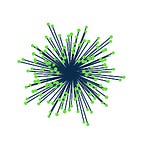Review of strategic options moving forward
This is the tenth post for the Community Data Hubs Documentation series. This series will document the thought and conversation trajectories within the process of creating the building blocks of our Community Data Hubs model and OEDP’s broader data stewardship work. The first of these blogs will document the progress of the Community Data Hubs Advisory Group, which is working alongside OEDP to tackle conceptual questions related to the model, including social and technical infrastructures, stewardship, and community data.
This post documents the eighth meeting of the Community Data Hubs (CDH) Advisory Group on August 23, 2023. In this meeting, the OEDP team reflected with the Advisory Group on the first Environmental Data Lab, and then presented its strategic plan for the next phase of CDH.
In regards to the Environmental Data Lab, group members commented on their experiences of what went well and what could have been improved:
- There was deep conversation that went into technical aspects of the law, and the conversation delineated solutions that were either legally or policy-based.
- The Lab could have benefited from more detailed examples regarding legal mechanisms to support participants in understanding how they applied to the case studies provided.
- Participants enjoyed the silent brainstorming time at the beginning of the breakouts, but could have used additional silent brainstorming and synthesis time at the end before re-grouping.
- The Miro board used for taking notes and making the flowcharts was a useful tool, but became messy during the session without a dedicated note taker.
Highlights of the strategic plan for the next phase of the CDH project includes the following:
- Recruiting 1–3 community partners via an open call for partnership to our network, and assessing their interests, priorities and capacities.
- This open call will include information on the CDH model, stipends, and timelines, and asks questions about prospective partners’ environmental data journeys and their communities’ shared goals for data usage and governance.
- Interested community groups will fill out a form answering these questions and OEDP will conduct an initial round of outreach conversations to introduce ourselves and the project.
- The OEDP team will host a half-day design sprint with each selected community partner. These design sprints will focus on a specific aspect of the CDH model that is most relevant to the community partner.
- In consultation or collaboration with each partner, the OEDP team will compile learnings from the design sprints to create a playbook where aspects of the co-designed CDH model will be articulated.
Group members had input on the open call and the structure of post-sprint follow-ups. Regarding the open call, group members suggested we:
- Partner with a group with whom we had a strong pre-existing link; this would be a good way of establishing trust early on.
- Design the open call as a light invite, and emphasize that we will not ask more of the groups than they have capacity to give, and to be transparent about what we are looking for and can deliver.
- Focus on partnering with groups who have already collected data, as they might get the most out of co-designing a governance tool.
Regarding the post-sprint follow-ups, group members suggested we:
- Offer a follow-up consultancy with value as an added incentive for a prospective partner unsure about the value of this process. We could provide services as a design and accountability partner at different intervals after the design sprint (e.g., 3 months, 6 months, 1 year) depending on the community partner’s needs.
- Integrate an evaluation component into check-ins or follow-ups. Ask questions about what potential impacts there were, if they know of other community partners with data who might be interested in participating, what went well, and what could be improved upon.
